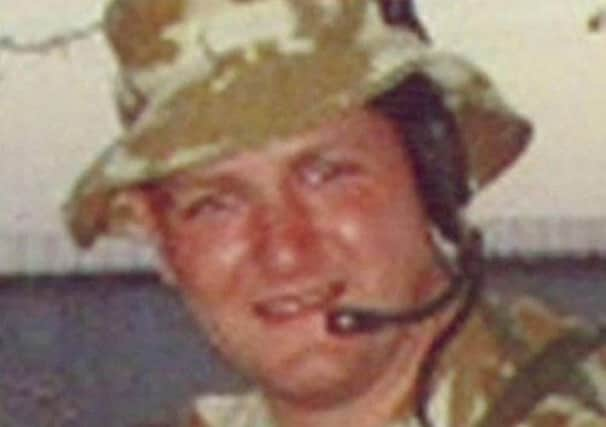Scots soldier died in Iraq ‘hellhole’, inquest told


Private Jason Smith collapsed after humid temperatures soared to more than 40 degrees.
Despite receiving attention after being rushed to a medical base, the solider from Hawick, in the Scottish Borders, died at Camp Abu Naji, Al Amarah, on August 13, 2003.
Advertisement
Hide AdAdvertisement
Hide AdAn inquest into the 32-year-old’s death three years later found he would not have lost his life if the British Army had followed correct procedures.
It discovered his death was caused by a “serious failure” after his difficulties adjusting to the sapping climate were not recognised.
The High Court ruled in 2008 that Human Rights laws could be applied to British troops in combat after Pte Smith’s mother, Catherine, launched an unwavering campaign to avoid similar future tragedies.
The Supreme Court later ruled that another inquest should be heard in light of that ruling.
Now, a decade on from Pte Smith’s death, a new hearing held in Oxford will explore the level of combat fitness and heat injury suffered in theatre, under new legislation.
Today Oxfordshire Assistant Coroner, Alison Thompson, said: “This hearing is the second inquest concerning the death of Private Jason Smith. He was, at the time of his death, a TA soldier.
“Following the first inquest in November 2006 a new inquest was ordered by the Supreme Court following judicial review proceedings in 2010.
“Shortcomings were identified in the course of that hearing and rulings were made about disclosure and the need to satisfy procedural requirements of Article 2 of the European Convention of Human Rights.
Advertisement
Hide AdAdvertisement
Hide Ad“This inquest will not only look at when, where and how Jason Smith died, but also the circumstances now enshrined in the new Coroners and Justice Act 2009.”
Lieutenant Colonel Stuart Cattermull, a former Major and the Commanding Officer of Pte Smith’s platoon, said conditions in Iraq were testing during the time of their deployment.
“It was difficult with the developing situation and also the climate,” said Lt. Col. Cattermull.
“We had problems in the city running parallel with harsher climatic conditions.
“It was extremely hot. We were extremely busy.
“We didn’t have enough resources, manpower to do what we were asked to do.”
The First Battalion The Scottish Borderers were based at a stadium known as Al Amarah - once a building designed for Saddam Hussein rallies.
Another of Pte Smith’s comrades, Sergeant Joseph Holmes, described the stadium as a “dusty, overheated, hot hellhole.”
However, a tearful Lt. Col. Cattermull continued: “We tried to do everything to the best of our ability.
“My best resource was my soldiers, who didn’t let me down.”
He said he couldn’t put the tragedy down to one factor.
Advertisement
Hide AdAdvertisement
Hide Ad“There were so many things that contributed to Jason’s sad demise,” he said.
“Did we do enough? We had a forced drinking policy by our Sergeant Major who ran force protection.
“Rest was circulated by rotating soldiers, placing them in areas which had some access to air conditioning.
“Where soldiers needed to go back to camp they went back to camp.”
Pte Smith had been seen by medics during the lead up to his death, the hearing was told.
He was ordered to rest but three hours later was seen stumbling down to where his comrades were and collapsed near an eating area.
Asked by the coroner if Pte Smith was overweight, the Lt Col replied: “He had a rugby playing build. A prop forward.”
The coroner added: “I think you described him as robust, but most of all he was determined.”
Advertisement
Hide AdAdvertisement
Hide AdThe Lt. Col. went on: “TA soldiers were not as fit as regular soldiers. There were exceptions of course, but as a group they were the least fit.”
He added: “Had we had a chance to integrate the TAs earlier, things may have been different.”
A parade for drinking two litres of water every two hours was undertaken at the camp between 9am and 5pm.
There was never a shortage of water but some of the soldiers complained about having to drink warm water at times, the hearing was told.
Generators were relied upon as no mains power was available.
Further air conditioning units were asked for by military bosses as there was limited space where it was available.
These additional units were already on order when Pte Smith died and arrived two days later, the hearing was told.
A yellow card was also given to soldiers to inform them of the importance of hydration and signs to look out for when they felt unwell.
The inquest will hear from 12 witnesses and was expected the last six days.
The hearing continues.